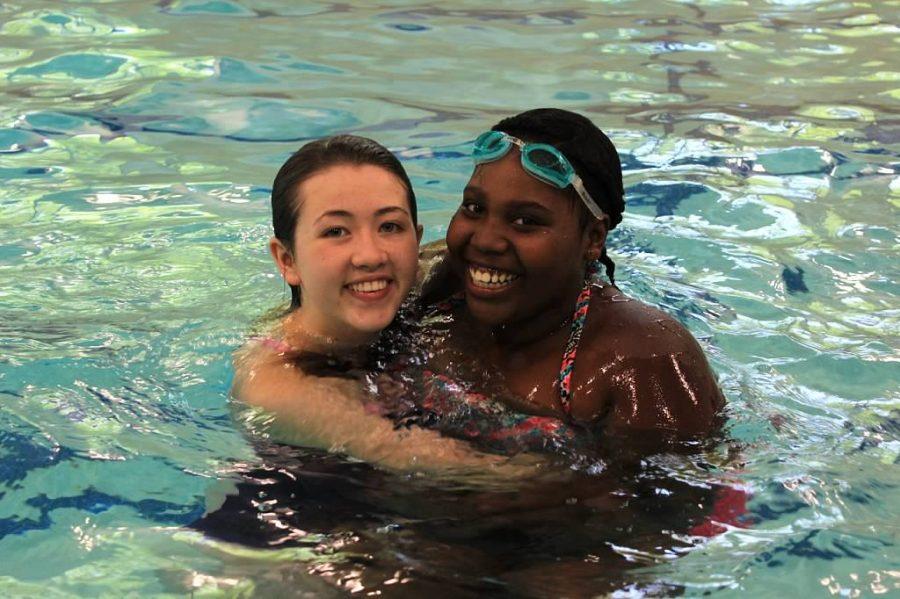31 Years of Umoja
July 6, 2016
For thirty one years, Camp Umoja has been a permanent fixture of summer life at NDP. Every year, students from Calvert Hall and Loyola join our girls to serve as counselors in a unique opportunity to serve children living in Baltimore City Public Housing. Counselors assist campers in arts and crafts activities, give them swim lessons, and teach them valuable life lessons, all the while having a blast. This year, the theme for camp was celebrating our city. Thus, activities included using finger paint to create crab posters, lessons on the Chesapeake Bay, and discussions about the problems facing Baltimore.
In Umojademics, the academic portion of camp, the campers were set an interactive project in order to create a plan to combat an issue in their community. Desmond Roberts, a 10 year old camp regular, wrote about the ways in which unemployment in Baltimore sparks the desperation which ultimately leads to violence. He suggested that new businesses be built in order to revitalize the community. Desmond’s 12 year old cousin, known to his fellow campers as “Little Ronald,” told some of the counselors that he would get guns off the streets because, “Guns don’t have any business being around where kids are playing.”
Our city is as in need of help from the campers and counselors as it has ever been. The death of Freddie Gray on April 19, 2015 continues to affect Baltimore as the officers charged in connection with his death appear on trial. In fact, Freddie Gray grew up in Gilmor Homes in Sandtown-Winchester, the same place where many of our campers live. Even more recent tragedies have impacted the campers as well. Already this year, more than 130 people have been killed in Baltimore, including Lor Scoota, a rapper who advocated for peace and who positively impacted many young people in the city.
Public Housing itself is facing changes which directly and indirectly touch the lives of our campers every day. Perkins Homes, public housing on the East Side where many of our session two campers come from, are likely destined to be torn down in order to make way for new mixed income development. Perkins’ 17 acres of real estate have only become desirable in recent years following the blossoming of nearby areas like Harbor Point and Johns Hopkins Hospital. While the residents have been promised compensation, some fear that their community is being torn apart to satisfy the needs of unnecessary gentrification. On the other hand, this may prove beneficial to the area by increasing property values and bringing in new jobs. As we wait to discover the outcome of these changes, it seems evident that the destruction of these homes will at the very least create instability in the lives of children who already live lives of uncertainty.
This being said, the amount of wisdom the campers revealed over their two weeks in camp was matched only by the amount of fun they had in the process. As ever, the boys rushed immediately to the basketball hoops while the girls got out board games and jump ropes. Without a doubt, the favorite aspect of camp was swimming. In the mornings, the kids practiced going under water, floating on their backs, and free style, while in the afternoon they jumped, splashed, and danced their way through free swim. On the second to last day, the campers saw their hard work pay off when they were awarded swim badges to signify their level of success. Many of the counselors recount that this was their proudest moment over the two week session.
As counselor Hiya Sawhney explains, her favorite part of camp is, “When the kids hug you goodbye before they mount the bus. Sometimes, they even say that they love you or miss you. That makes it seem worth it!” Elizabeth Lepore, also a counselor, shared a story about the camper she shared with Hiya. “Davia told us one morning that she was nearly late for the bus. She had to run to catch up with it, and she said that the thing that kept her going was her desire to come back to us.” The bond between counselor and camper is something very special. Even as the bus rolls away on the last day, both parties reach out their hands as if hoping to stop the inevitable separation. While the campers take home their art projects and swim badges at the end of the two weeks of camp, the counselors take home something just as special. They take home the memories with which they will feed their passion for improving the lives of their public housing neighbors the other fifty weeks of the year.

